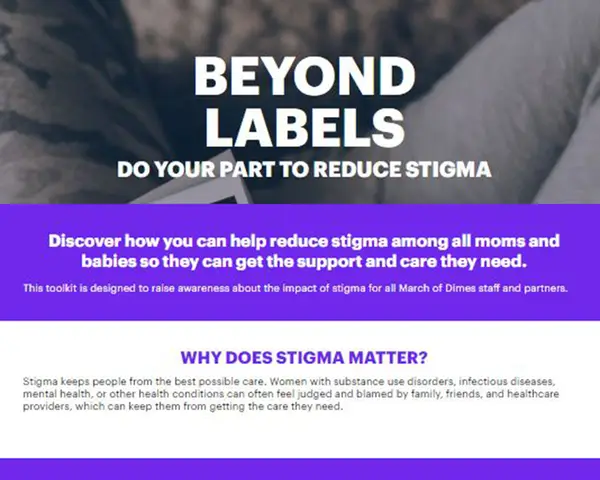An interactive website for March of Dimes staff and partners
Objective:
To educate March of Dimes staff and partners on the meaning of stigma and its harmful effects in a public health setting.
Approach:
We developed an interactive website containing the latest information on stigma, based on literature, existing campaigns, and input from public health professionals.
Impact:
Published in June 2019, the website is in use and is now undergoing enhancements. It won an award for graphic design in the area of public health communication.
Have you ever stopped to think about the assumptions you make about people with different types of health conditions? When you think about someone who has a mental health disorder, who do you think of? What type of characteristics do you assume they have? What about someone living with HIV? What about a baby who was born dependent to opioids?
It’s natural for us to associate particular characteristics with broader groups and patterns of behavior. But when we do this with individuals, we tend to stereotype them and give them a set of associated traits without getting to know them as a person first. Just thinking these labels to ourselves about a group of people with a particular health issue can affect how we treat and interact with them as individuals, which can ultimately harm their health. This is stigma.
Stigma keeps people from accessing the best possible care. People with substance use disorders, infectious diseases, mental health, or other health conditions often feel judged and blamed by family, friends, and healthcare providers, which can keep them from getting the care they need.
Stigma has consequences. People who are stigmatized often feel ashamed and unworthy, resulting in self-stigma, lower self-esteem, and depression. Although the types of stigma may vary by health condition and across cultures, the effects are notably alike. People who experience health-related stigma also experience social isolation, poor quality of life, reduced access to healthcare, delayed diagnosis of a condition, reduced adherence to treatments, and even illness and death.

2019 HEALTH+WELLNESS Design Award Winner
Selected from over 2,000 entries, Beyond Labels was highlighted as a standout in graphic design in the area of public health communication.
Explaining Stigma to Public Health Professionals
Stigma can be challenging to address because it is driven by both conscious and unconscious beliefs and embedded in our organizations, institutions, and policies. We developed an interactive website, Beyond Labels, to support March of Dimes staff and partners in helping people receive the best possible health care, free of stigma. The website is designed to
- Increase awareness of what stigma is;
- Identify and acknowledge the fears, myths, and misconceptions that drive stigma;
- Promote action to make institutional environments stigma free; and
- Provide a voice to those who have suffered from stigmatizing attitudes and beliefs.
We developed the interactive website in the spring of 2019 with significant input from public health professionals, the intended audience for the website. To inform the development of the website, we reviewed the literature and existing tools, trainings, and campaigns related to stigma. We also conducted in-person focus groups and virtual meetings with public health professionals. We launched the interactive website on June 26, 2019, for March of Dimes leadership, regional staff and partners.
Beyond Labels has four main sections.
- Lift the Weight of Words: a 70-second video designed to show the emotional toll stigma places on people.
- Stigma: Understanding the Problem: Content designed to increase knowledge by addressing questions such as: What is stigma? Why does it matter? Why does it happen? What does it look like?
- Stories of Stigma: Nine stories from people impacted by stigma. Promoting direct exposure to stigmatized individuals has been shown to be an effective strategy to reduce stigma.
- What You Can Do: Actionable steps that March of Dimes staff and partners can take to support the reduction of institutional stigma, including “say this, not that” and “be a change agent”.
Expanding Beyond Labels' Future Impact
To increase the scope and reach of Beyond Labels, RTI will work with March of Dimes to enhance the website in 2020 by adding more stories from individuals who have experienced stigma, tools and resources to promote awareness of stigma, and promote the website via March of Dimes’ professional and personal networks.
- March of Dimes
- Centers for Disease Control and Prevention (CDC)



